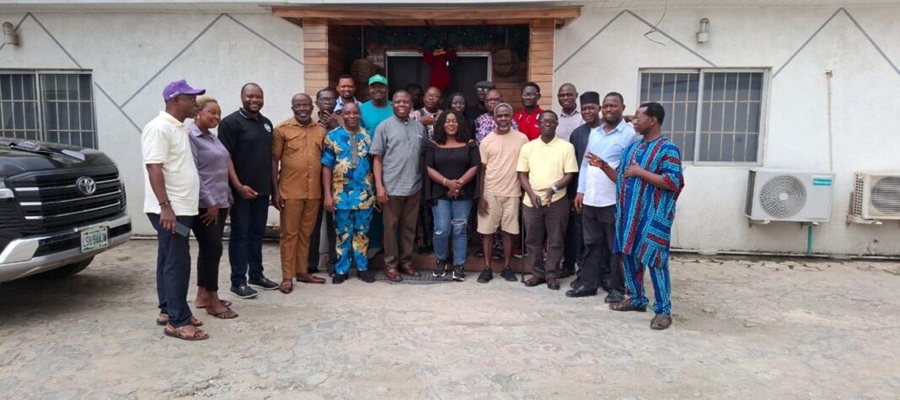Broadcasting
JAAIDS, CFC Promote Safe Motherhood in Nigeria
Communicating for Change (CFC) and Journalists Against AIDS (JAAIDS) recently hosted a roundtable discussion on Safe Motherhood in Nigeria, also considering the role of HIV and Aids in infant and maternal health.
Globally, Nigeria has one of the highest maternal mortality rates, with 1,100 deaths per 100, 000 live births and a lifetime risk of maternal death of 1 in 18; consequently approximately 1 in every 9 maternal deaths worldwide occur in Nigeria alone. For women infected with HIV and Aids, the benefits of using Anti Retroviral Therapy
(ART), or in Preventing Mother to Child Transmission (PMTCT) are lost if a mother goes on to die in childbirth.
To help address these issues, JAAIDS and CFC invited the media, various civil society organizations as well as medical practitioners to discuss the issue of Safe Motherhood in Nigeria and the role of HIV and Aids. The panel at the roundtable comprised of Dr Akerele, Unicef consultant, Dr Adeyanju, physician at Adeoyo Maternity Hospital, Abosede Oladayo of Hope Worldwide Nigeria and Olayide Akanni, executive director, JAAIDS. The roundtable was chaired by Eugenia Essell, general manager, CFC.
During the discussion, many factors that jeopardize women’s safety were considered, including unsafe abortions and a lack of education and awareness, with many women using unskilled traditional birth attendants instead of professionally trained midwives and doctors.
When available, the cost of medical care and the accessibility of healthcare centres are often barriers to women using their services, especially for those living in remote rural areas. Additionally, poverty and a lack of good nutrition can also cause infant and
maternal mortality and low weight births. Also, many women do not have the authority to demand healthcare for themselves, but are instead reliant on their families’ approval, often waiting for a complication to occur before seeking medical attention. All of the
attendees present at the roundtable agreed on the urgent need to address maternal mortality, where thousands of women die for exercising their natural right to procreation.
Whilst there has been some improvement in maternal healthcare and HIV/Aids, for example, the introduction of Prevention of Mother to Child Transmission (PMTCT) programmes and the implementation of a national Integrated Maternal Newborn and Child Health (IMNCH) strategy, more still needs to be done. The 2015 deadline for the Millennium Development Goals (MDGs) is gradually looming and Nigeria still has a
long way to go to before meeting goals 5 and 6, to reduce child mortality and to improve maternal health.
Dr. Tajudeen Akerele Unicef HIV/Aids consultant, said: ‘Nigeria ranks 9th highest in the world in terms of maternal mortality, however many deaths can be averted with knowledge and low cost precautions. If women receive appropriate care during and after their pregnancy, both at home and at the community level, the chances of
maternal and infant mortality are significantly reduced.
Additionally, to reduce maternal and child mortality, it is important that healthcare providers deliver quality services in a child and mother friendly way, that mothers are provided with a regular supply of quality drugs, and that infants receive proper immunization.’
Dr. Adeyanju of Adeoyo Maternity Hospital, Ibadan, said: ‘It is important that men take an interest in their partners and offer support as male involvement can make a positive difference to maternal health; all too often, women seek medical support only in
the event of an emergency and as a last resort, which causes delays to receiving treatment. All women expecting to be pregnant should consult their doctor to diagnose and treat any pre-existing conditions, before they become detrimental to the health of the
mother and her baby. Finally, I am calling for improved capacity in healthcare centres and labs, with the establishment of effective patient tracking systems, so infections and complications can be effectively monitored and treated.’
Abosede Oladayo, Aids Ambassador, Hope Worldwide Nigeria, said: ‘I am an HIV positive woman, who is married and has given birth to my children without passing on HIV; I use my experiences to encourage other women who have faced discrimination and stigma as a result of their HIV and Aids status. Many women are afraid to disclose their
condition to their husbands and families which means they do not receive appropriate medication, either for themselves or their children, which results in unnecessary and avoidable deaths. I am calling for increased awareness and information of HIV and AIDS, in order to promote discussion and visibility, limit maternal mortality and reduce the stigma associated with HIV and Aids.’
Broadcasting
Tim Akano Recounts 20-Year Growth, Media Support at NITRA End-of-Year Meet

Mr. Tim Akano, New Horizons Chief Executive Officer, took centre stage at the Nigerian Information Technology Reporters’ Association (NITRA) annual end-of-year meeting on Thursday, December 18, 2025, recounting the company’s remarkable growth and reaffirming free IT training for journalists.

Tim Akano, New Horizons Chief Executive Officer, in a group photograph with NITRA Members
Speaking directly to IT media members at the company’s training facility in Lagos, Akano acknowledged the critical role journalists played in supporting New Horizons during its formative years two decades ago.
He detailed how the firm evolved from a handful of staff to one of Africa’s leading ICT skills training organisations, now employing about 500 staff across multiple training centres nationwide.
Akano Spotlights Youth Training, University Partnerships
Akano highlighted that New Horizons has trained over 500,000 youths, particularly tertiary institution students, equipping them with practical IT skills essential for Nigeria’s digital economy.
He announced recent partnerships with universities, including a new agreement with Afe Babalola University, to scale hands-on training programmes for students.
“This growth would not have been possible without the media’s support in documenting our journey,” Akano stated, pledging continued free IT skills training for media members to remain competitive in the evolving digital landscape.
Reciprocal Support Defines Long-Standing Partnership
The venue hosting the NITRA meeting underscored Akano’s generosity; NITRA Secretary Chidiebere Nwankwo secured the free facility after contacting him—a gesture consistent with New Horizons hosting multiple association events and training IT journalists since its inception 20 years ago.
Participants shared personal testimonies of Akano’s support, including veteran journalist Aaron Ukodie, whose daughter—an Accounting graduate from the University of Johannesburg—received NYSC placement and IT scholarship at New Horizons.
The Guardian’s Yemi Adeyemi recounted Akano accommodating his editor’s child for mandatory IT training after other firms declined.
Members praised Akano’s commitment to human capital development as evidence of deep appreciation for the media community that chronicled New Horizons’ success over two decades.
Broadcasting
NIMC rolls out Pre-Enrolment Portal for seamless NIN registration

National Identity Management Commission (NIMC) has launched the NIMC Pre-Enrolment Portal to revolutionise the National Identification Number (NIN) enrolment process, enabling applicants within Nigeria and in the Diaspora to capture biodata online prior to biometric verification at enrolment centres.

NIMC
Accessible via penrol.nimc.gov.ng, the platform allows users to fill enrolment forms, schedule appointments, upload supporting documents securely, and manage personal details directly, thereby slashing congestion, minimising wait times, boosting data accuracy and enhancing overall service efficiency at centres nationwide.
NIMC Director-General and CEO, Engr. (Dr) Abisoye Coker-Odusote, spearheaded the initiative as part of the Commission’s technology-driven strategy to fortify institutional performance, aligning with President Bola Ahmed Tinubu’s Renewed Hope Agenda that emphasises digital transformation, efficient public service delivery and inclusive national development.
Dr Kayode Adegoke, Head of Corporate Communications, highlighted key benefits including simplified biodata handling, confidential data protection through robust security measures, reduced physical centre visits and heightened operational effectiveness, urging all prospective enrollees to adopt the portal for a faster, citizen-friendly experience.[conversation_history]
The move underscores NIMC’s mandate under the NIMC Act No. 23 of 2007 to manage the National Identity Database, issue NINs and foster a reliable digital identity ecosystem vital for national planning, with users advised to complete pre-enrolment online before heading to selected centres for biometrics.
Broadcasting
MultiChoice Talent Factory Calls for Entries Into Fully Funded Film Training Programme

MultiChoice Talent Factory (MTF), a Pan-African film and television training institution, has announced the opening of applications for its 2026 intake.

MultiChoice
The fully funded programme is open to African graduates aspiring to become directors, filmmakers, scriptwriters, producers and storytellers.
According to MultiChoice, the nine-month accredited curriculum combines online learning with intensive in-person training, and is designed to balance theoretical knowledge with practical immersion.
MTF academies are located in Kenya, Nigeria and Zambia, and serve aspiring filmmakers from 14 African countries. Since its inception in 2018, the initiative has trained 296 filmmakers, with graduates producing more than 42 movies aired on DStv, GOtv and Showmax platforms.
Organisers said alumni of the programme have gone on to establish over 50 production companies, while many continue to work within the MultiChoice ecosystem.
Graduates have also won accolades at the Africa Magic Viewers’ Choice Awards, Kalasha Awards, Uganda Film Festival and Women in Film Awards.
Applications for the 2026 intake close on Feb. 27, 2026. Interested candidates can visit https://apo-opa.co/3XW53oE for programme requirements.

 News3 days ago
News3 days agoUS Begins Partial Visa Ban on Nigerians January 1

 E-Financial2 days ago
E-Financial2 days agoFIRS says NIN, CAC Numbers to Serve as Tax IDs from 2026

 News3 days ago
News3 days agoGlo Extends Christmas Greetings, Urges Unity and Care for Others

 News3 days ago
News3 days agoDPLAN Threatens NDPC with Legal Action for Setting aside $32.8m Meta Fine

 E-Financial3 days ago
E-Financial3 days agoNOVA Bank Opens Regional Office in Owerri

 Telecom2 days ago
Telecom2 days agoOyedele Dismisses Claims Bank Accounts Without TIN Will Be Frozen

 E-Financial2 days ago
E-Financial2 days agoAfDB Group Mobilises Global Private Capital to Close Africa’s Financing Gap

 E-Financial3 days ago
E-Financial3 days agoNaira Stability, Lower Borrowing Costs Expected in 2026 — CBN Survey














